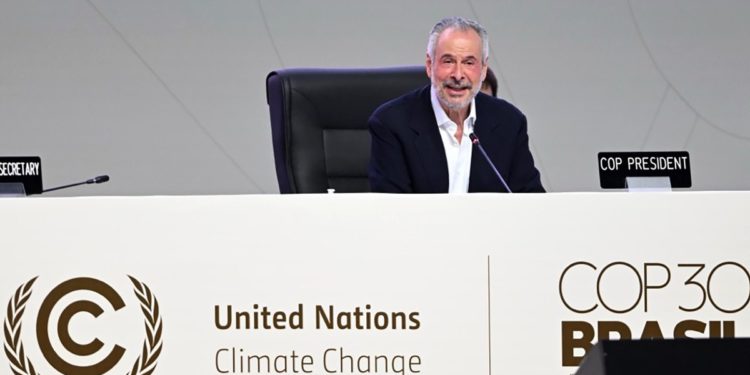The COP30 Presidency hosted an open dialogue on Tuesday with representatives from civil society constituencies under the United Nations Framework Convention on Climate Change (UNFCCC), focusing on strategies to accelerate the implementation of a just energy transition.
Ambassador André Corrêa do Lago, COP30 President, led the discussion with the nine UNFCCC civil society constituencies. He emphasized that effective climate action must go beyond government negotiations, involving collaboration among people from all sectors of society.
“This space reflects one of the most important principles of the UNFCCC process — that climate action is not only negotiated by governments, but is built through cooperation among peoples,” said Ambassador Corrêa do Lago. “The Open Dialogue embodies this spirit, bringing together Parties, civil society, and all constituencies to listen, exchange ideas, and co-create solutions.”
The COP30 President reaffirmed that the global response to climate change must “begin and end with people,” underscoring the need for the energy transition to encompass the entire economy and society.
“If we want to accelerate the implementation of the Paris Agreement, we must ensure that every step of this transition protects livelihoods, creates decent work, and reduces inequalities,” he added.
UNFCCC Executive Secretary Simon Stiell also took part in the session, stressing that achieving a just transition requires faster implementation, particularly at national and local levels.
“Climate action is working, but we need greater speed and scale,” Stiell noted.
The Open Dialogue brought together negotiators, observers, and representatives from nine UNFCCC civil society constituencies, including organizations representing youth, women and gender, Indigenous peoples, trade unions, research institutions, and farmers.
The discussion explored the role of international cooperation in supporting a just transition and how global commitments can be translated into tangible national and local actions.
Bert De Wel, Global Coordinator for Climate Policy at the International Trade Union Confederation (ITUC) and representative of the Trade Union Non-Governmental Organizations (TUNGO), summarized the discussions:
“We heard YOUNGO (Youth Organizations) make very concrete suggestions on how to address the financial dimension. IPO (Indigenous Peoples Organizations) highlighted legal aspects of ensuring free, prior, and informed consent. RINGO (Research and Independent NGOs) and the farmers’ constituency also shared valuable input, while the Women and Gender constituency focused on critical minerals,” said De Wel.
The dialogue reaffirmed civil society’s essential role in shaping an inclusive, fair, and people-centered approach to the global energy transition ahead of COP30 deliberations.




















